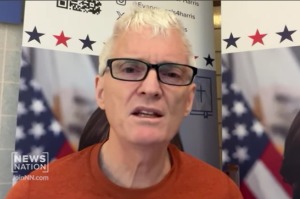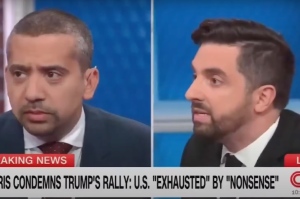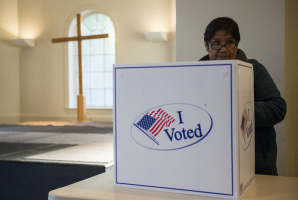Campaign Hits Swing-State Churches on Final Sunday
On the final Sunday before Election Day, volunteers for both presidential candidates fanned out to churches in competitive states, congregations bused worshippers to polls to vote early and a battle of wills erupted in church parking lots over the distribution of political literature.
Taking political messages to places of worship carries risks. Churches can lose their tax-exempt status if they take positions for or against a candidate directly or indirectly.
Officials with both the John McCain and Barack Obama campaigns said their efforts are careful to keep churches out of trouble, but it's hard to know whether lines are crossed in such large-scale operations.
The McCain campaign recruited church members to pass out literature, take part in peer-to-peer phone banks and participate in the Republicans' final 72-hour get-out-the-vote machine that began Sunday, said Bob Heckman, the campaign's director of conservative outreach.
About 15,000 people volunteered, he said. On Sunday and the past two weekends, volunteers in 14 states who belong to Protestant megachurches, politically active conservative churches and Catholic parishes distributed literature at their churches comparing McCain and Obama on hot-button issues like abortion, gay marriage and judges. "Who Shares Your Values?" the flier says. "You decide."
The flier also suggests that Obama wants to provide sex education for kindergartners — a claim from a disputed McCain ad about a failed bill from Obama's days in the Illinois Legislature. Obama has said kindergartners, under the bill, would have been taught to defend themselves against sexual predators.
Heckman said the literature was given out "where appropriate," including church meeting space, tables outside or car windshields.
Asked whether volunteers were told to get permission from clergy or church staff, Heckman did not directly answer.
"We only urge them to do whatever they think is appropriate or customary within their congregation," he said. "The one thing we always do make clear is that if a church official would prefer we not distribute literature on church property, we respect their desires."
One conservative Catholic political activist questioned the effort.
"If this were truly a national effort, the way it was in 2004, it might turn the election," said Deal Hudson, who helped marshal Catholic support for President Bush. "But it's too targeted — and targeted because of the lack of resources. The grassroots are there, but it's a really missed opportunity."
On the Obama side, members of black churches in battleground states were asked to read what an aide described as a nonpartisan letter from the Illinois senator during church announcements.
Obama campaign officials declined to provide a copy of the letter or discuss it. But during the primary campaign, volunteers and staffers read a similar letter from Obama at black churches in South Carolina that didn't explicitly ask people to vote for him but highlighted issues and encouraged voter participation.
Over the last two weekends in Florida, meanwhile, Democratic activists helped churches bus members to early-polling places after services. Pastors in conservative churches were encouraged to show a video from the Southern Baptist Convention's Ethics & Religious Liberty Commission, urging Christians to vote and highlighting "faith, family, marriage and life."
In an annual exercise, activists descended Sunday on church parking lots with campaign literature.
One of the largest efforts was orchestrated by the anti-abortion group Priests for Life, which produced what it calls a nonpartisan guide contrasting McCain and Obama's positions.
The Rev. Frank Pavone, the group's national director, said volunteers avoid taking literature inside churches without permission and place fliers in parish parking lots unless they encounter resistance.
The U.S. Conference of Catholic Bishops advises that Catholic organizations should not authorize the distribution of "partisan campaign materials or biased voter education materials" in private parking lots.
The Rev. Michael Watson of St. Andrew parish in Columbus, Ohio, said he encountered people placing material "paid for by the Ohio Republican Party" on windshields in the church lot in violation of a diocesan policy barring distribution of any political literature on church property.
Watson said in an e-mail the activists wouldn't follow the policy, so police officers assigned to traffic control and other duties at the parish "responded to it," he said.
In Pennsylvania, an anti-Obama flier from an anti-abortion political action committee also appeared at churches. The flier features images of men holding hands on a wedding cake and photos of what appears to be a dismembered baby.
To push back, the left-leaning group Catholics United dispatched staff and volunteers to six cities Sunday to alert church officials about unwelcome material.
"Our position is it's a violation of the sacred space of the church to have political — and especially partisan propaganda — in this space," said Chris Korzen, the group's executive director.
Korzen said another goal was to protect parishes' tax-exempt status. Pavone accused the group of partisan motivations and said fliers from outside groups don't endanger churches.
Robert Tuttle, a professor of law and religion at George Washington University, said IRS regulations on politics deal only with conduct by churches. So leafletting by outside groups, announcements from Obama backers or McCain volunteers handing out pamphlets are not problematic for the IRS, he said.
"What you're really looking for is the church itself endorsing or supporting a particular candidate," Tuttle said. "That would take someone acting on behalf of the church."




























